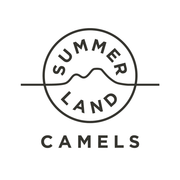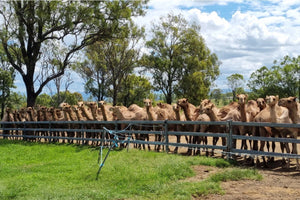Low-Stress Stock Handling: The Key to Happy Camels and High-Quality Camel Milk
At Summer Land Camels, our approach to camel management is built on care, respect, and understanding. One of the most important techniques we use is low-stress stock handling (LSSH)—a method that ensures our camels remain calm and cooperative while also improving milk production and animal welfare.
What is Low-Stress Stock Handling?
Low-stress stock handling is a humane and efficient way to manage livestock without relying on excessive force, loud noises, or fear-based techniques. Instead, it focuses on reading animal behaviour, applying gentle pressure, and giving them time to make choices, ensuring that they move willingly rather than through coercion.
This approach is particularly important as we move towards regenerative agriculture, where large herds need to be moved with minimal disruption. Traditional methods using whips, dogs, or loud noises create stress and can negatively impact animal behaviour. As Paul Martin, CEO of Summer Land Camels, explains, LSSH is not just about using low energy, but understanding where and how to apply pressure and release, allowing animals to feel safe and in control of their own movements.
Why is Low-Stress Handling Essential for Camels?
While LSSH benefits all livestock, camels have unique needs that make it even more essential.
Milk Production and Oxytocin Release
Camels require high levels of oxytocin to let down their milk. However, stress triggers cortisol, which suppresses oxytocin and inhibits milk flow. Traditionally, camels were milked with their calves present to help override stress-induced cortisol spikes. At Summer Land Camels, our handlers work carefully to bring camels into the dairy stress-free, ensuring they reach their full milk production potential without unnecessary distress.

Training Feral Camels
Training wild camels straight from the desert is a complex process. Poor handling can set back progress by weeks, while good engagement allows camels to adapt quickly. The goal is to make camels feel that being in the yards, dairy, or handling areas is their choice, rather than being forced. When animals willingly participate, there is less resistance, fewer injuries, and a more positive experience for both camels and handlers.
Camel Behaviour and Adaptability
Unlike cattle or horses, camels are not naturally flighty; instead, they are highly intelligent and observant. They require extra time to process new environments and can be suspicious of changes. By using positive reinforcement and consistent training, we help camels build confidence, making handling and movement much smoother.
Practical Techniques We Use at Summer Land Camels
Pressure and Release: Applying just enough pressure to encourage movement, then backing off to allow the animal to process what is happening.
Gate and Paddock Training: Camels are naturally cautious around gateways and unfamiliar spaces. We regularly train them to move through paddocks and gates to prevent issues later.
Gradual Exposure and Reinforcement: Our training system involves graded levels, from wild feral camels (Grade 1) to well-trained dairy camels (Grade 12). Each stage reinforces positive experiences, ensuring smooth progress.
Minimising Noise and Stressors: Avoiding loud noises, sudden movements, or unnecessary force reduces fear-based reactions.

How Does This Impact Our Camel Milk and Products?
Handling camels with care doesn’t just improve their welfare—it directly affects the quality of our camel milk and dairy products.
Better Milk Let-Down: Reduced stress leads to higher oxytocin levels, ensuring maximum milk yield and improved quality.
Higher Nutritional Value: Milk from stress-free camels contains more immune proteins, which are essential for the health benefits of camel milk powder, fresh camel milk, and our camel milk skincare range.
Longer Shelf Life: Less stress means better milk composition, leading to longer shelf life and enhanced product stability.
Aligning with Sustainable and Ethical Farming
At Summer Land Camels, ethical treatment of animals is a cornerstone of our philosophy. Low-stress handling aligns with our commitment to sustainable and regenerative agriculture by ensuring camels are relaxed and content. A calm animal grazes more effectively, maintains better health, and integrates seamlessly into a farm ecosystem without unnecessary disruption.
This approach also meets the expectations of our visitors, who come to see happy, well-cared-for camels in a natural and humane setting. Unlike older handling methods that relied on nose pegs or force, our techniques foster a trust-based relationship, ensuring our camels live stress-free, happy lives.

Low-stress stock handling is not just a technique—it’s a mindset. By working with our camels rather than against them, we create a better environment, higher-quality products, and a more sustainable future. Whether it’s for camel milk, camel milk powder, or camel milk skincare, stress-free animals ensure premium quality at every stage.
At Summer Land Camels, we are proud to lead the way in ethical camel farming, demonstrating that compassionate handling isn’t just the right thing to do—it’s also the most effective and beneficial approach.
🐪 Interested in learning more about our camels and ethical farming practices? Visit Summer Land Camels, do the Tour, Taste & Camel Encounter and learn about our approach firsthand!




